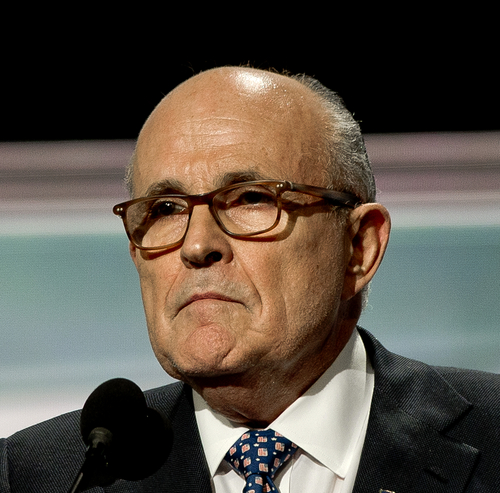New York court suspends Giuliani's law license, cites false claims about election's legitimacy

Rudy Giuliani. Image from Shutterstock.
Rudy Giuliani’s law license was suspended in New York on Thursday for “demonstrably false and misleading statements” to bolster a narrative that the 2020 presidential election was stolen from former President Donald Trump.
The Appellate Division’s First Judicial Department of the New York Supreme Court suspended Giuliani on an interim basis in a June 24 decision, concluding that his conduct “threatens the public interest.”
Among the false statements were that thousands of dead people voted, that voting machines were manipulated, that hidden suitcases of ballots were counted, and that “illegal aliens” voted, according to the decision.
Giuliani made the false and misleading statements about widespread voter fraud to courts, lawmakers and the public, the court said.
“The seriousness of respondent’s uncontroverted misconduct cannot be overstated,” the appeals court said. “This country is being torn apart by continued attacks on the legitimacy of the 2020 election and of our current president, Joseph R. Biden.”
When false statements are made by an attorney, it also erodes public confidence in the legal profession and its role “as a crucial source of reliable information,” the opinion said.
The decision focuses on these statements in which Giuliani:
• Said in Pennsylvania more absentee ballots came in during the election than were sent out. The numbers that Giuliani cited were “simply untrue,” the appeals court said.
• Told a Pennsylvania court that the Trump campaign was pursuing a fraud claim “when indisputably it was not,” the appeals court said.
• Repeatedly stated that dead people voted in Philadelphia, putting the number at various times as 8,021 and 30,000, He also said the late boxer Joe Frazier was still voting there in 2020.
Frazier’s eligibility to vote was canceled in February 2012, three months after he died, and Giuliani failed to provide “a scintilla of evidence” to support his dead voter claims.
Giuliani said his statements were justified because Pennsylvania agreed to purge 21,000 dead voters in 2021; however, purging voters doesn’t prove that they actually voted or that they were even dead at the time of the election, the appeals court said.
• Said Dominion Voting Systems’ voting machines manipulated vote tallies, without referencing a hand audit that confirmed the election results. The company’s defamation suit against Giuliani is pending.
• Claimed that 65,000 or 66,000 or 165,00 underage voters illegally voted in Georgia. The state investigated the claim, comparing the list of everyone who voted with their birthdays. The finding: There were zero underage voters in the 2020 election. Giuliani had cited “expert” affidavits, none of which were provided to the appeals court.
• Said more than 2,500 Georgia felons voted illegally. Georgia investigated and found 74 potential felony voters. Even if all of them voted, the number would not support a claim of a stolen election.
• Claimed that 800 or 6,000 dead people in Georgia voted in the election. A Georgia investigation found that two votes may have been improperly cast in the names of dead people.
• Said video evidence showed Georgia election officials retrieving ballots from suitcases hidden under a table. In reality, boxes containing ballots were placed under a table by election workers who wanted to leave for the evening; the boxes were reopened, and the contents were scanned when the state official monitor intervened and told workers that they had to remain until 10:30 p.m. Georgia investigated and found no improper activity.
• Said thousands of “illegal aliens” had voted in Arizona, and “the reality is probably about 250,000.” He was unable to produce any sources supporting his varying figures.
Giuliani had conceded that the statements attributable to him were made during his representation of Trump and the Trump campaign. He “seemingly claims,” however, that the disciplinary rules violate his First Amendment rights as applied to him, the appeals court said.
The appeals court rejected the argument.
“While there are limits on the extent to which a lawyer’s right of free speech may be circumscribed, these limits are not implicated by the circumstances of the knowing misconduct that this court relies upon in granting interim suspension in this case,” the appeals court said.
Giuliani also asserted that he can’t be punished for making statements when he didn’t know that they were false. But Giuliani would have to demonstrate a legitimate dispute about whether his statements were false.
Instead, he relied on his own affidavit, a “confidential informant” and references to hundreds of witnesses, experts and investigative reports, none of which have been provided or identified, the appeals court said.
“Conclusory or vague arguments will not create a controverted issue as to whether there has been misconduct,” the appeals court said.
The New York Times, Law360, Talking Points Memo, the Washington Post and Law.com had early coverage of the decision.
Giuliani is represented by Barry Kamins and John Leventhal of Aidala, Bertuna & Kamins.
“We are disappointed in the court’s decision suspending Mr. Giuliani prior to being afforded a hearing on the issues that are alleged, and we do not believe that our client poses a present danger to the public interest,” the lawyers said in a statement issued to Law.com.
See also:
ABAJournal.com: “Afternoon Briefs: State bar considers ousting Giuliani; pelt-wearing protester is judge’s son”
ABAJournal.com: “In first federal court appearance since 1992, Giuliani argues lack of observer access despite dropped claim”
ABAJournal.com: “Afternoon Briefs: Lawyers seek Rudy Giuliani’s suspension; scholars support post-presidency impeachment power”
ABAJournal.com: “Hundreds of lawyers call for ethics probes of attorneys for election fraud claims; are bar charges likely?”



